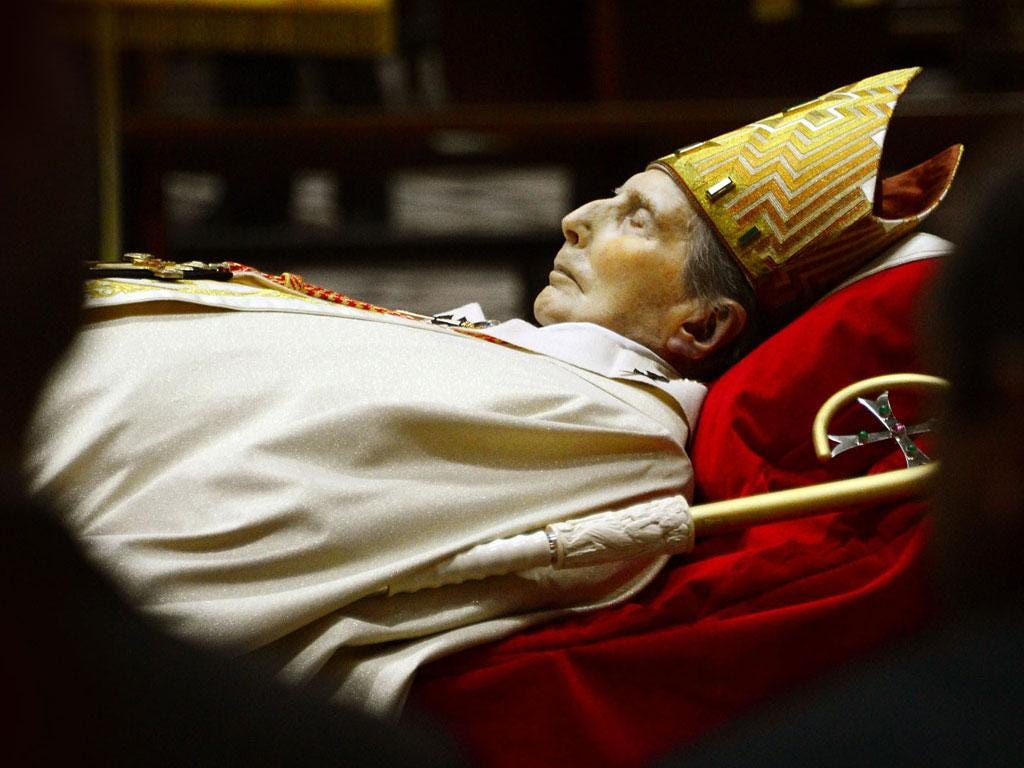
Cardinal Carlo Maria Martini, his final interview, and a damning critique that has rocked the Catholic Church
Michael Day
One of Italy's most revered cardinals has stunned the Catholic Church by issuing a damning indictment of the institution from the grave, calling for its "transformation".
Hours after Milan's former Archbishop, Cardinal Carlo Maria Martini, died on Friday at the age of 85, the leading daily paper Corriere della Sera printed his final interview, in which he attacks the Church – and by implication its current leadership – for being "200 years out of date".
"Our culture has aged, our churches are big and empty and the church bureaucracy rises up, our rituals and our cassocks are pompous," the Cardinal said. "The Church must admit its mistakes and begin a radical change, starting from the Pope and the bishops. The paedophilia scandals oblige us to take a journey of transformation."
Church insiders believe he wished for the interview to be published following his death.
Cardinal Martini, who was on the liberal wing of the church hierarchy, was once tipped to succeed John Paul II as Pope. His chances of being elected fell away when he revealed he was suffering from a rare form of Parkinson's disease and he retired as Archbishop in 2002. Instead, the ultra-conservative German cardinal Joseph Ratzinger became Pope Benedict XVI in 2005.
The body of Cardinal Martini has been laid out in Milan cathedral since noon on Saturday, with thousands of people coming to pay their last respects. His funeral will take place there this afternoon.
The left-wing Mayor of Milan, Giuliano Pisapia, who recently angered church authorities by recognising gay couples and providing them with the same rights the city gives married couples, led the tributes to the dead Cardinal. "Difficult times require words of wisdom and hope from great men," he said. "Carlo Maria Martini illuminated the way for the entire city, not just for part of it. For this reason, today more than ever, Milan mourns its Archbishop".
Cardinal Martini was noted for supporting the use of condoms, at least a decade before the Vatican grudgingly accepted they might be acceptable in certain situations to prevent the transmission of HIV. He also questioned the Church's line on gay relationships and divorce – calling on it to reconsider what constituted a family in the 21st century or risk losing even more of its flock.
Conservative voices in the Church tried to repair damage caused by Cardinal Martini's criticism. Marco Tarquinio, the editor of the bishops' daily paper, L'Avvenire, accused the mainstream press of distorting the Cardinal's comments, although he did not give specific examples.
"The attempts to distort and manipulate in an anti-ecclesiastical way the Cardinal's final hours on this earth are a bitter reminder of similar actions against even the blessed John Paul II," he said.
The suspicion – ever present in Italy – that the Vatican has tendrils everywhere, even in the mainstream press, was heightened by the failure of the article to appear on the Corriere della Sera website. Following inquiries by The Independent, Corriere's editor, Ferruccio de Bortoli, said there had been no pressure to keep the article off the website. It was then published online yesterday evening. Other leading newspapers failed to give the cardinals' comments much coverage.
Robert Mickens, the Rome correspondent of The Tablet, called for Cardinal Martini's deathbed comments to be taken very seriously.
"They must be seen in the context of coming from a man who loved the Church and who gave his life to the institution. He made a profound statement, which he had already said many times to Benedict and John Paul II in private," he said.
Cardinal Martini caused controversy in his final days after refusing artificial feeding, contravening church policy on end-of-life issues.
Mr Mickens said that although Cardinal Martini's ideas had "zero support" in the Vatican, he was revered by rank and file members. "The people in the trenches looked up to him. He was a giant. We're in a very conservative period. But that won't last forever. A whole generation have been inspired by Martini's writings. That will be his legacy."
Cardinal Martini: A holy life
Carlo Maria Martini was born in Turin in 1927, entered the Society of Jesus in 1944 and was ordained to the priesthood in 1952. His appointment as Archbishop of Milan, Italy's most important diocese, in 1980 was considered highly unusual; Jesuits are not traditionally given bishop posts. He retired from the post in 2002, the year he was diagnosed with a rare form of Parkinson's disease. He then moved to the Pontifical Biblical Institute in Jerusalem. He passed away at the Jesuit-run Aloisianum College in Gallarate near Milan.
No comments:
Post a Comment